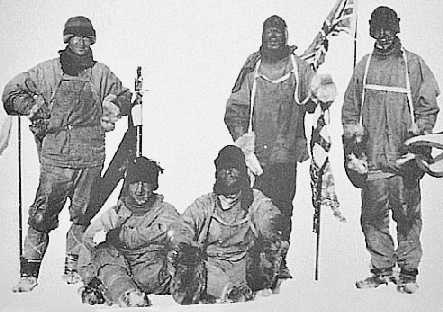 Captain Robert Falcon Scott's last letter to his wife before he died of, erm, cold, is exhibited at the Scott Polar Research Institute Museum in Cambridge from the 17th January.
Captain Robert Falcon Scott's last letter to his wife before he died of, erm, cold, is exhibited at the Scott Polar Research Institute Museum in Cambridge from the 17th January.But first a question to the rest of the world outside of the UK - have you ever heard of Roald Amundsen ?
No ?
Ha!, didn't think so, no-one has, he's only known inside his native Norway as the hero who was the first man to arrive at the south pole, while here in the UK he's the bas'tad who beat Scott of the Antarctic to the pole - a quest which ended in trgedy for our national hero who, along with his team of fools, died on the way back.
Captain Robert Falcon Scott is a great British hero, he has all the qualities of a great British hero, he has a hero's name, all hero's have names that no parent would consider giving their child - would you call a child of your's "Falcon", no of course you wouldn't, not unless you wanted that child to be an explorer and national hero.
He also had that other great British attribute, the desire to go and do something so totally futile and so incredibly dangerous that all sane humans will stand around, shake their heads and mutter, "he's a nut, or a hero, I can't decide which".
The British nation love futile gestures, our history is littered with them - The Charge of the Light Brigade in 1854 when a Brigade of Dragoon Guards charged on horseback armed only with swords and complete buffoonary into fifty Russian field guns, not suprisingly they failed in their endeavour, were cut to smithereens by the guns, but have been held in esteem as great British heros ever since, we love heroic failure.
Like wise Scott of the Antarctic and his 1912 mission with four mates to walk to the south pole clad in canvas clothing to claim the south pole for the British Empire - as if we'd need some ice - all went well for the intrepid heros until they arrived at the pole to find that they'd been beaten there by an anonymous bas'tad Norweigian a month earlier - "oh bollacks" Robert Falcon Scott was heard to mutter, "there goes my hero status".
Turning around to head back to their iced-in ship "Terra Nova" the party of five were hit by terrible ice storms and in temperatures of 70 below freezing they managed to lose Petty Officer Edgar Evans who fell during a storm and was left in a coma.
Another, Captain Lawrence Titus Oates (see, another heros name, who would use the name "Titus" on a child), suffered from terrible frostbite but our heros would not abandon him to his fate on the ice and slowed the pace down despite the urgent need to get to a food and fuel dump just 11 miles in fron tof them - they had one days hot food ration left and two days cold food when an ice storm hit them and confined them to their one tent for four days at which point Captain Lawrence Titus Oates made his famous last statement "I am going outside, I may be some time" - what a truly heroic and futile hero he was - and he lived just a few miles away from where I'm sitting right now.
The remaining futile, foolhardy and yet true British bloodstock fookin idiots took to their sleeping bags and died of , erm, cold-ness some time later after which an adoring nation took them to their busom and celebrated their idiocy in a thousand boys book of daring-do - every British schoolboy for the next millenium will know of Scott of the Antarctic and his completely pointless ambition to reach the pole first.
All of which shows the English Cricket team in a different light -a rriving in Australia for their bi-annual thrashing and humilation at the hands of antipodeans who seem to be playing a different game to our lads, we can at least feat their arrival back on these shores at some point in the future as true British futile heros, no-one does futility quite like the British.














1 comment:
This is a great blog. The Noble but Futile Gesture is indeed something at which the British have excelled over time and tend to regard with great affection.
Capt. Lawrence Oates was certainly a fine example - from his anguish over colonial cruelties in early 20th century Egypt, to the agonies of his frostbite and more with Scott of Antarctica. A very human hero.
Post a Comment